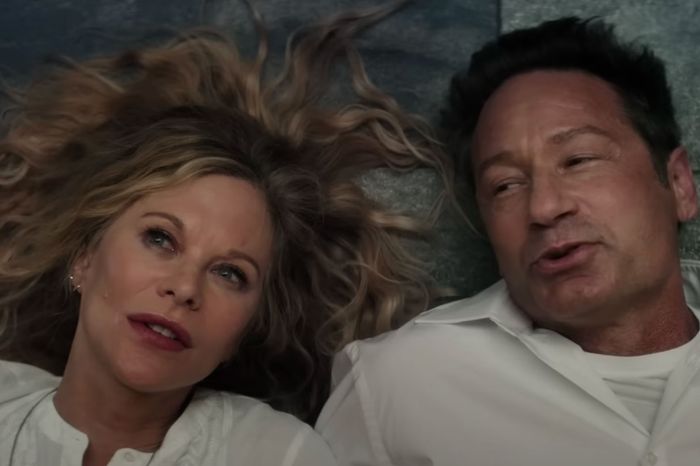
There’s a scene early on in What Happens Later in which David Duchovny, playing a finance guy named Bill who’s on a business trip, walks up to a digital poster for a movie called RomCom with the tagline “Fall in love with love again.” If he notices the enticement on the screen, we can’t tell, because all he’s interested in is the outlet, which he frees up by unplugging the console so that he can charge his phone. What Happens Later happens to be a romantic comedy itself, directed by the category’s one-time queen Meg Ryan, who also stars alongside Duchovny as woo-woo market-research poller Willa. But it’s a romantic comedy that treats its very existence as a struggle against prevailing forces. It is, contrary to the films that made Ryan an icon, about people in their 50s, former lovers who aren’t bright-eyed or bouncy-cheeked and are instead closed off and tired and encumbered by all kinds of regret. It takes place in an airport, a classic setting for a grand finale and a dreary one for an entire movie. And it’s headed to theaters, via indie distributor Bleecker Street, something even the fictional movie being advertised within it isn’t pulling off — RomCom is “Coming this summer, only on M+.”
What Happens Later has such a chip on its shoulder about its relationship to its own maligned genre that it never actually gets around to much by way of pleasure, which you might argue is that genre’s main purpose. It’s a strange, sour two-hander, reminiscent of that similarly minimal Winona Ryder-Keanu Reeves rom-com from a few years ago, Destination Wedding. The problem is not that emotionally rough-for-the-wear, middle-age people can’t also flirt and fall in love, the problem is that What Happens Later, which was adapted from a play by Steven Dietz, approaches that idea as though it’s not entirely convinced either. Its characters, Bill and Willa, were lovers back when they were 20-somethings in Madison and haven’t seen each other since their breakup, which they both remember differently. Bill’s on his way to Austin for work, while Willa’s headed to Boston for what she claims will be a visit to a friend who’s getting divorced when they’re waylaid by an epic snowstorm. The cities aren’t the only rhyming element here — these two share a last name and a first initial, W. Davis, which serves as a pet name. Also, it’s Leap Day, which the movie treats, in a nod to Willa’s superstition, as a gift of extra time to, say, reconnect with an ex.
Those are a lot of quirky touches for a movie that mostly consists of its characters airing their grievances, against one another, but also against millennials and the world in general. And there’s more — no one mentions where the airport is located, and the PA announcer sometimes directly responds to the characters. He’s voiced by someone credited as Hal Liggett, whose real identity Ryan has been keeping secret, and while my uninformed guess would be Bryan Cranston, he’s also just the only other character in the film. Ryan breaks up potential visual monotony by allowing the airport to become more and more stylized a space as the film goes along — at one point, Bill and Willa have drinks at a bar whose set is basically just a row of lights in the dark behind them. But while the film reaches for whimsy, up to and including having its characters throw a dance party for themselves in the dimmed and emptied-out hallways, it never commits. It’s more interested in focusing on two slightly battered people trying to hash out what went wrong between them years ago, as they contrast the people they used to be with the people they became.
Which is fine! It’s common knowledge that the rom-com has been an endangered species for years, though that’s only really been true for studio offerings — it has thrived on television and in indies in ways that are more wide-ranging and varied in their characters than the versions that made it to the big screen in the ’80s, ’90s, and ’00s. I wish, instead of seeing itself in contrast to those bigger films, What Happens Later could have relaxed into being the unapologetically Gen-X affair it wants to be, complete with Duchovny’s character railing against the alternative hits turned Muzak constantly playing over the airport’s speakers. He and Ryan don’t quite mesh — he underplays things while she still knows how to lean into her innate luminosity; neither is especially funny — but they’re sometimes good together, and both are capable of great charm. “You look the same — you look like you, more like you than you used to,” Bill tells Willa, and while neither of their very familiar faces actually do look exactly the same, they’ve only changed in ways that continue to make them compelling to watch. No one can stay America’s sweetheart or its primetime heartthrob forever, and why would anyone want to? The best parts of What Happens Later are when it lets its characters just be people who still want to find love and find some of its warmth in the embers of this long-ago relationship. It’s too bad there aren’t more of those moments.
More Movie Reviews
- The Thriller Drop Is a Perfect Addition to the Bad-First-Date Canon
- The Accountant 2 Can Not Be Taken Seriously
- Another Simple Favor Is So Fun, Until It Gets So Dumb


